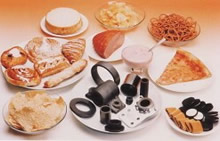 Potable Water Potable Water
NSF International has certified grades of GRAPHALLOY material for use in municipal well pumps and treatment plant applications. These Graphalloy grades are certified to NSF/ANSI Standard 61-"Drinking Water System Components- Health Effects" and approved in the category for Multiple Water Contact Materials up to 180°F.
The Water Regulations Advisory Scheme (WRAS, UK) has approved a grade of GRAPHALLOY material as suitable for contact with wholesome water for domestic purposes having met the requirements of BS 6920-1:2000 and/or 2014 'Suitability of non-metallic products for use in contact with water intended for human consumption with regard to their effect on the quality of the water'.
Where to use NSF and WRAS Certified Grapahalloy Bushings
Food Applications
| |||||||||
Bearings and bushings recommended for high temperature service and for pump applications where the pumpage cannot be relied upon to lubricate the shaft bearing or wear parts
Thursday, October 31, 2019
Graphalloy for Drinking Water Applications, Food Applications
Wednesday, October 16, 2019
Common Reasons Why Oil/Grease Lubricated and Plastic Bearings Fail
Bearings are essential machinery components. Bearings protect the moving shaft from wear and damage, keeping it in place with little friction. They need to be lubricated in order to do so. Oil/grease lubricated bearings and self-lubricating plastic bearings are common but often times not capable of handling extreme situations. Below are the main reasons either option might fail.
Reason #1: High Temperatures
Reason #2: Low Temperatures
Reason #3: Vibration
Reason #4: Corrosives and Washout
Reason #5: Dust, Ash, and other particulates
Reason #6: Dry Run and Low Viscosity Pumpage
Reason #7: Heavy Loads
Reason #8: Infrequent Operation/Inactivity
Click here to learn more about each reason
Subscribe to:
Posts (Atom)

 In 1996, the U.S. Food and Drug Administration gave GRAPHALLOY a favorable opinion for use in pumps, baking ovens, and equipment for transporting and handling food. That opinion was updated and refreshed in 2018.
In 1996, the U.S. Food and Drug Administration gave GRAPHALLOY a favorable opinion for use in pumps, baking ovens, and equipment for transporting and handling food. That opinion was updated and refreshed in 2018.